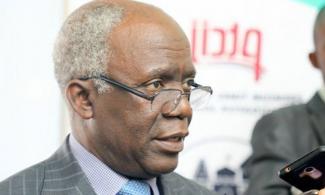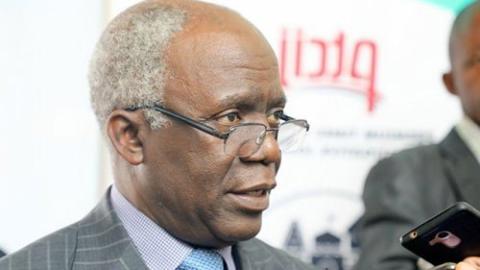
Emefiele had on March 24, 2015, said it was illegal for landlords or school proprietors to demand rents or fees in dollars.
Femi Falana, a Senior Advocate of Nigeria (SAN), has written to the Central Bank of Nigeria, demanding information on measures taken to stop the growing practice of trading goods and services in foreign currencies instead of the Naira in Nigeria.
CBN governor, Godwin Emefiele had on March 24, 2015, said it was illegal for landlords or school proprietors to demand rents or fees in dollars.

“The official currency for doing business in Nigeria remains the Naira. Collecting rents or school fees in dollars in Nigeria is illegal. We like to advise those involved in these practices to desist from them because CBN would very soon begin to go after them,” Emefiele had warned.
The CBN governor, who also spoke on efforts to check the pressures on the Naira as a result of the unnecessary demands for foreign exchange, said steps must be taken to prevent the dollar from dominating the country’s economy.
In a freedom of information (FoI) request, the CBN was asked to provide the information of their prosecution within seven days in accordance with the act.
The letter read, “On March 24, 2015, the Governor of the Central Bank of Nigeria (CBN), Mr. Godwin Emefiele frowned on the growing practice of trading goods and services in foreign currencies instead of the Naira in Nigeria.
“In particular, Mr. Emefiele, said that ‘The official currency for doing business in Nigeria remains the Naira. Collecting rents or school fees in dollars in Nigeria is illegal. We like to advise those involved in these practices to desist from them because CBN would very soon begin to go after them.’
“But for reasons best known to the members of the Board of the CBN the devaluation of the Naira via dollarisation has been allowed to continue unabated. The financial crisis has been compounded by some politicians who are involved in buying up available dollars in the market to compromise party officers and delegates as well as administrative and judicial officers.
“Thus, due to the criminal conduct of such politicians and other interest groups involved in collecting dollars for goods and services in the country the Naira is currently exchanging for over N600 to a dollar in the so-called black market.
“In view of the foregoing, we are compelled to request for information on the measures adopted by the CBN to halt the growing practice of trading goods and services in foreign currencies instead of the Naira in Nigeria.
“As this request is made under the Freedom of Information Act, 2011 you are required to furnish me with the requested information not later than 7 days upon the receipt of this letter.”